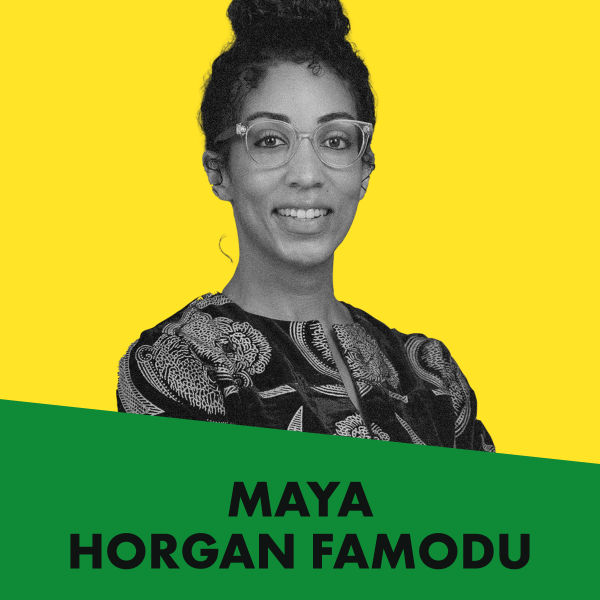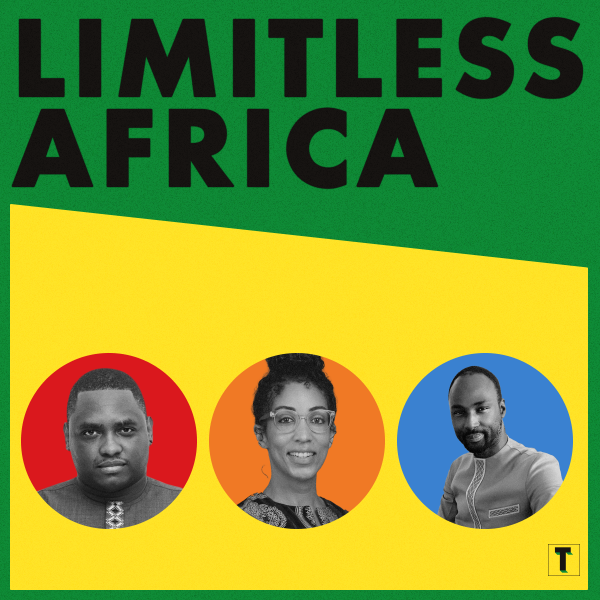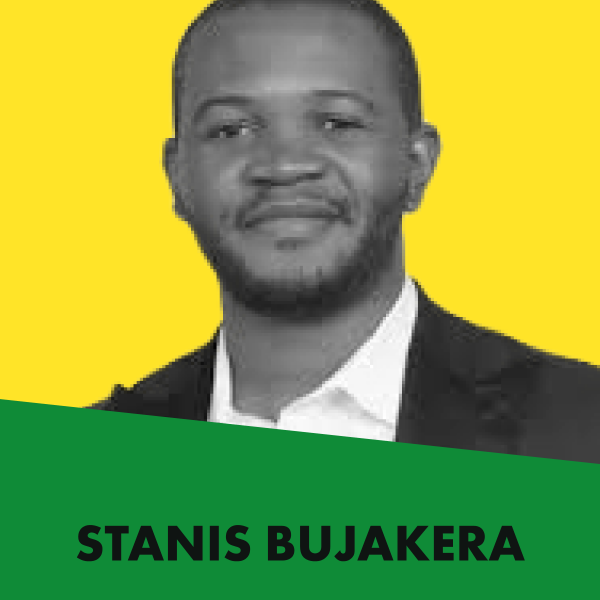"Nigeria is hot with fast girls" - The sprinters going for Olympic Gold
With guests Favour Ofili, Olayinka Olajide, Rosemary Chukwuma, Tiana Eyakpobeyan

Episode notes
Rosemary Chukwuma, Favour Ofili, Olayinka Olajide and Tiana Eyakpobeyan will be representing Nigeria in the 4 by 100m sprint relay at the 2024 Olympics. They tell us about the challenges and opportunities that led them to Paris.
Transcript
Claude: Rosemary Chukwuma, Favour Ofili, Olayinka Olajide and Tiana Eyakpobeyan.
These women may soon be household names.
They’ll be representing Nigeria in the 4 by 100m sprint relay at the 2024 Olympics. The Games start on July 26th, in Paris, France. And the world’s best athletes will be gathering to compete.
We spoke to them about the challenges they face, what it means to be representing their nation at this elite level, and what they want to say to all the other young women out there trying to achieve amazin...
Claude: Rosemary Chukwuma, Favour Ofili, Olayinka Olajide and Tiana Eyakpobeyan.
These women may soon be household names.
They’ll be representing Nigeria in the 4 by 100m sprint relay at the 2024 Olympics. The Games start on July 26th, in Paris, France. And the world’s best athletes will be gathering to compete.
We spoke to them about the challenges they face, what it means to be representing their nation at this elite level, and what they want to say to all the other young women out there trying to achieve amazing things.
Rosemary, Favor, Olayinka and Tiana spoke to our sports correspondent Esther Appiah-Fei. Here’s the conversation.
Esther: Hi Rosemary, you won a gold medal at the Commonwealth Games in 2018 and now you’ve qualified for the Olympics – congratulations! Beyond winning medals, what’s your goal for the 2024 Olympics?
Rosemary: The record is not far, it’s not far from anybody that’s training. So I know I’ve done enough this year. I’ve done my training. It’s just… my coach has done his part, it’s left for me to just go there and do my own part. So, the African record, one lead everything, is not… it’s not bad for me, as Rosemary. So it’s just… I want to focus on getting the goal.
Esther: Do you believe sports can change the lives of women in Africa?
Rosemary: It’s possible, because I started in 2016 with Coach Murphy, and we travelled to Ilorin and all those stuff, like all those youth games. From there, 2018, I went to Commonwealth Games. So I started… I started exploring, like… so I think sports really helps a lot of people, especially we Africans, like we Nigerians, Jamaicans… any athlete that has opportunity to go outside and to compete. Like… it’s really a great thing for the person.
Esther: What advice do you have for young girls in Nigeria and Africa inspired by your journey?
Rosemary: If you keep this energy going, you will explore… and that’s what is happening, because I had to keep my head down. I’m very stubborn. Because of the people I surrounded myself with, I had to… to learn from them. And… and it wasn’t bad learning from them, and… here I am today. Running fast. 10:8. So I think… as an athlete, we need to be respectful, disciplined, and learn from people… so I think they should just put their heads up, never give up… even if the season isn’t going well. Just focus on what will come in the future.
Esther: Hello, Olayinka, welcome to the limitless podcast. You’re also an amazing athlete – you currently hold a personal best of 11.19 seconds in the 100m. You won multiple medals at the African Games, including gold in the 4x100m relay.
So how has participating in sports affected or influenced your identity as an African woman?
Olayinka : Well, participation in sport has really influenced my life and identity in a good way. You know, there are a lot of things that Athletics will teach you, right from training to competition grounds, and even after the competition. You know, it’s a game of :”win” or “lose”. So athletics will shape your mentality and that is what it has done, to me. I think differently now. I observe things differently. And right now I will say I’m viewed differently. Yeah, so this track and field has taught me how to endure a lot of things. Because you know, in training, you make sure you finish your workout no matter how hard it is and this has really helped me off the field because no matter how difficult other things I invest myself in, no matter how difficult it seems to be, I’ll make sure I finish it. So this is one of the things that athletics has really done for me.
And another thing is that I respect people more than the way I do before cause, athletics has taught me that no matter how good you are, you’ll always have someone better than you in the sports. No matter how fast you are, you’ll always have people better or let me say people faster than you in the sport. So it’s just like, you fear nobody, but you respect everybody.
Yeah, that’s how it is, so I respect a lot of people. Once I see you, I respect you, because I don’t know what you can do. I don’t know what you can er, what you’ve done before what you can achieve later. So it has really influenced a lot of things in my life. And I’m happy to, you know, to be a sports person.
Now talking about the influence of the sports majorly now, I think I travel a lot these days like due to competitions happening around the world, I, the federation can just call you anytime and say oh, you’re going to so so and so place, pack your bag and come to camp. You’re traveling to so and so places. Now I travel a lot and I think that’s one of the influences I enjoy so much. I travel a lot and people, people seem to know me more than they do before. And everywhere I go, it’s always ”Oh, that’s the athlete, that’s the athlete”. So I think I won’t talk about fame yet because I really don’t like talking about being famous or being popular, but then a lot of people seem to know me now.
Esther: Wow, that’s an amazing story right there. Can you tell us some of the challenges that you have faced as a african woman in sports
Olayinka: When it comes to challenges I have faced as an athlete they are a lot. I think I’m not the only one facing them, I think some athletes are facing the same challenges and unfortunately, we are yet to overcome them. One of the challenges is the track that we train on. There are bad tracks in almost all states they’re very bad tracks, especially the one in Abeokuta. MKO stadium the track is very bad, they allow cars and buses to move on them, they allow parties to be conducted in the stadium, and when they come to arrange chairs or speakers or something the buses will you know, drive on the track they will move buses on the track and they are spoiling the track the more, and the more you complain nobody’s doing anything about it. Most times you want to train your coach will be directing you to leave lane one, go to lane four because lane two and lane three is bad or lane four, er, lane five and lane six is nothing to write home about. You know, the track is very bad and I think Abeokuta is not the only state with a bad track, soI just pray they do something about it because it’s still the same thing and in competitions too. In fact there’s poor organization, like you don’t start competing the time you’re supposed to compete they tell you like 10, you get to the ,you get to the track and and nothing is been set yet you warm up, warm up, warm up, you know, warm up cool down, just for sometimes competition will be postponed. I think they are a lot, they are a lot. Those are challenges we are facing right now as athletes but when it comes to having a coach or trainer with the right equipment, I don’t have any challenges about that because I have the best support ever.
Esther: Well, those must be really tough challenges over there. Hopefully the Federation solves them soon enough. All right, Olayinka, what are your goals, your primary goals and expectations for the upcoming Olympics?
Olayinka: Everyone loves setting goals. I love to set goals too for myself, but sometimes I just allow God to you know, direct me or to keep on writing the story, for any competitions I have ahead of me so this upcoming Olympics I’ll just allow God to you know keep writing the story, I’ll allow him to do his will. I actually have goals because I’m expecting us to be on the podium during the Olympics. I really see us on the podium cause currently, Nigeria is hot with fast girls and also with fast men so I believe anything is possible for God to do and i believe that we can make the podium with the kind of girls we have currently so I really want us to be on the podium winning something, winning something, so that’s one of the major goals I have and I believe that with God everything is possible
Esther: How do you think your participation in the Olympics can inspire other young girls to pursue a career in sport and other male dominated fields?
Olayinka: I think at this point in time, we shouldn’t think this sport is being, okay, maybe traditionally it’s been dominated by men but currently men and women both rule these sports, so in what way do I hope my participation in the Olympics will inspire other young African women? Well, it’s not just about young African women this time, its about everybody. My participation in the Olympics, I believe will inspire a lot of people, not just young African women, I believe it will inspire the women. It will inspire the men too Yeah, because even women inspire men. So it’s not just about other young African women. Now, if I should go to the Olympics and do well , I believe a lot of people will be inspired to pursue whatever they want to pursue in sports, and with the way things are currently, or with the way people see women doing sports, some people might be reluctant to pursue their goals but i just need to let them know that they should do whatever they said they heart to do, they should do whatever they set their heart do, they should make sure they follow their dreams without letting someone use mouth or use talk to weigh them back. So I believe that my participation in sports is going to inspire a lot of people, not just young African women.
Esther: Welcome to the Limitless podcast.
Tiana, you’re also incredibly talented. At the age of 17, you won silver medals at the African U18 Championships and the Commonwealth Youth Games. You’re one of Africa’s fastest young sprinters with times of 11.29 seconds in the 100m and 23.53 seconds in the 200m. How did it feel qualifying for the four by 100 relay event with your team?
Tiana: Um it actually feels good and I’m so determined to be a part of this team to qualify for the Olympics. It’s a great feeling. And I’m so thankful for it.
Esther: Can you tell us some of the challenges you have faced as a Nigerian woman athlete?
Actually, the challenges I have faced as a female athlete in coming into sports, you know, we need more finances, to take good care of ourselves as a female athlete, even than male athlete but having people that encourage and support us like my coach, my teammates, and also my family, and importantly its God has always showed,a great impact in my life. And that’s how I’m able to overcome. It is actually a great thing.
Esther: What are your primary goals and expectations for the upcoming Olympics in Paris?
Okay, my primary goal is having to push beyond and do more better than I’ve been doing before. Coming to the Olympics, I knew I wouldn’t be running in the individual race. So all effort to be put into the four by one to make sure me and the ladies qualify for the finals, and also have a place in the podium.
Esther: That’s a great one there Tiana. Now, as you already know, world athletics is planning on paying Olympic gold medalists for the first time ever at the Paris 2024 Olympics. Do you think that’s going to give you and your teammates that extra boost of motivation to go all the way for gold?
Tiana: Actually yes, is a good motivation for us to fight hard to make it to the podium at the Olympics because that is a part of encouragement. Having something like that will make us have confidence in ourselves and we’ll see that if you make it to the podium good things are going to happen.
Esther: Tiana, we know you are 17 You know, very young, very young. With so much prospects and so much potential ahead of you, in your athletics career. We want to know how does it feel representing Nigeria at this at this global stage? You know, considering how young you are right now,
Tiana: It actually feels good, because my story is kind of an interesting one, coming from last season. Last season was my breakout season, winning the double sprint at the national double sprint. Ever since then, I’ve made it in the world, and also making it to the olympics. So it’s really a great feeling and I’m actually happy for the moment. And it’s a testament that great things are going to come out from me. and I’m part of the Nigerian future as well.
Hi Favour, Welcome to Limitless Africa. You;re a top Nigerian sprinter and you hold the African record in the 200m. You’re the first African woman to run sub-22 seconds in the 200m. So tell us Favour, how have sports affected your identity as an African woman, both on and off the field?
Favour: Uhm, i would say it has to do with discipline. Because if I’m not doing um, if I’m not doing sports, where will I be? I don’t know. Maybe I’ll be disturbing my mom and dad for money. So I think that, that kind of made me disciplined to know what to do or what not to do and stay on the right path. And yeah, doing sports helped me with that
Esther: What are some of the challenges that you have faced as a Nigerian woman athlete? And how have you been able to overcome them to reach the Olympic standard?
One is diet,knowing what to eat, because I eat a lot. I eat oo ei. I eat a lot very well. So I will say eating my diet is one thing that I’ve struggled with because you don’t want to be overweight and you know, especially when you want to like be light and you want to be heavy by this point during build up and all that that so diet is something that has been a challenge to me. Because if you if your diet is wrong, your body will feel it, that’s when injury starts and all those things so. Uhm and another thing that I’ve struggled with is, when I was in school, I struggled with homework, stuff like combining School and Sport. But now. I don’t think, I will say is my diet that I’m struggling with.
Esther: What are your primary goals and expectations for the upcoming Olympics?
Favour: Stay healthy, stay healthy, be patient with the whole process you get it ?. And then, you know, I just want to be in finals in any of the events I’m in. Any of the events like two of the events both the four by 100, 200, I want to be at the finals cause at the finals, anything can happen.
Esther: Thank you to Rosemary, Favor, Olayinka and Tiana. These women are role models – for their talent, stamina and team-work. They’re breaking records and smashing stereotypes. We’re behind them and wish them every success in Paris.
Listen next
"It wasn't just an overnight thing. Seeds were planted."
With guests: Maya Horgan Famodu
LISTEN NOW 55 min
How did I make my first million?
With guests: Maya Horgan Famodu, Moulaye Taboure, Moutagna Keita
LISTEN NOW 15 min








